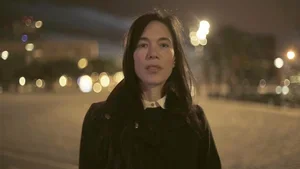Bennington Stories: Ramaa Mosley '95
Ramaa Mosley '95 is a filmmaker, writer, and director. She is the recipient of a United Nations Global 500 Award and was named SHOOT’s Top 10 Female Directors To Watch, 2015.

Bennington Stories is a series of first-person messages that share voices from throughout the unique and multifaceted Bennington community.
A Belief in Magical Thinking
I grew up watching international films and US films such as James Bond and John Wayne movies with my adopted dad. To him, film was more than moving images. It was the same for me: film was storytelling in motion, an encapsulation of that unmistakable, ineffable sensation when an ordinary person steps into a heroic role. “Close Encounters Of The Third Kind” was another father/daughter favorite; among other things, Steven Spielberg’s classic film about reaching for the unknown.
I was born in an ashram in New Orleans: a city steeped in magical thinking. Eventually, my family moved from New Orleans to California to follow a spiritual teacher. I was homeschooled and when I was 13, I was riding my bike past Libbey Park in central Ojai. A film crew was shooting there. I made my way across the set and confidently approached the director. I asked him if I could stay on set and work. This same director eventually became a close mentor to me.
I made my first documentary when I was fifteen years old; it was called “We Can Make a Difference” and it was about climate change. My mentor lent me equipment. I started shooting Super 8 films in my spare time. I graduated from high school when I was 16. That was when I first heard about Bennington.
I didn’t have a conventional upbringing. I was raised in a belief system that many might think to call unorthodox. Yet, it was this same belief system that made me believe I could wander onto a film set as a child, walk up to the director, look them in the eye, and ask them for something. In that sense, I was always going to be a storyteller.
It all comes back to magical thinking. Yet, the point for me has always been to have an impact on the world, outside of art. We are here, on this planet, to do good for other people.
I found myself attracted to the unconventional nature of Bennington’s curriculum. At the time, the college had no Film department, only Photography and Theater. Ultimately, the major that I created for myself was a combination of those two disciplines.
Bennington had allowed me to expand the parameters of what I knew myself to be capable of, at least in a creative sense. Coming from a home-schooling background, this was the gentlest transition I could have hoped for.
Before I even graduated I was signed by a commercial production company and started my career. These days, I direct films and television and am focused on mentor emerging, underrepresented filmmakers. I do not subscribe to the so-called “auteur theory.” In fact, I find it to be destructive. More than that, it’s prejudicial. Who determines who gets to be an auteur, and who does not? It’s just another hierarchal power structure – one that all too often favors the status quo, meaning white male filmmakers who are then provided with resources that others simply don’t have access to.
If we all subscribe to the auteur theory, there is nothing left for us to discover. One begins to hold oneself to an impossible standard. When one fails to meet that standard, creativity itself sputters out and halts.
Founding the Gen Z advertising agency Adolescent Content came from that desire to mentor diverse storytellers and give them opportunities that have long been withheld. As an organization, Adolescent has allowed for a structure that encourages media artists to get their work off the ground by finding access to the brand and entertainment opportunities they both desired and deserved.
The #BringBackOurGirls campaign came in the wake of the Chibok schoolgirls kidnapping of 2014. Upon hearing of the 200+ missing Nigerian girls, I found myself unable to sleep. I became physically ill. How could this be happening, in a so-called “just” world? Local Nigerian activists were doing what they could, but the silence in North America and Europe was deafening. I had no choice: I had to get involved.
Not all my films are politically motivated. My first movie, “Brass Teapot,” was about people who monetize physical pain. It was a film that was panned at the time, and one whose themes have recently been re-appropriated and re-evaluated by members of Gen Z.
No creative act should be undertaken solely for the validation of others. To make the world better is one thing, to court cool points is another. Whatever you do, you have to believe in it. That manner of thinking has fostered a kind of fortitude in me, one that has allowed me to embrace failure, whether it was the less-than-generous critical reaction to “Brass Teapot,” or the struggles of getting my next film made on a tight schedule, and with a tiny crew.
Art and activism are the two fundamental sides of me. Art for art’s sake is wonderful, but I also know in my heart that it will never be enough.
Ramaa Mosley '95, Major Thematic
Recipient of United Nations Global 500 Award
SHOOT’s Top 10 Female Directors To Watch, 2015